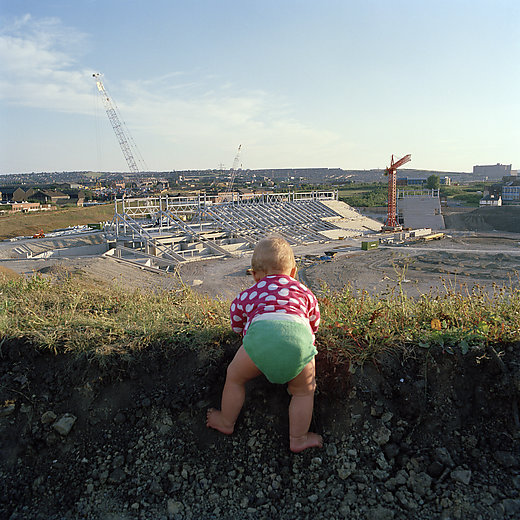In the late 1980s and 90s Sheffield reached a pivotal moment in its history, one which saw it begin a journey of regeneration and transformation into the city we know today. The first steps on that journey were documented by a group of gifted photographers whose work reflected both the hope and hard realities of the time. Today, as major developments in the city see its landscape continuing to evolve, a new exhibition at Weston Park Museum re-presents those original photographs to chronicle a significant turning point for Sheffield and its people.
Opening on Friday 23 October, The Sheffield Project: Photographs of a Changing City will bring together images by acclaimed, socially-engaged photographers including John Davies, Anna Fox, John Kippin and more.
For many people in Sheffield the last decades of the 20th century were a time of great upheaval and hardship; the aftermath of the Miners’ Strike was still being felt, the steel industry’s workforce had been decimated, and mass unemployment and dereliction were widespread. But it was also a time in which the city began to imagine its future, one that would include the Meadowhall retail development, the transformation of the lower Don Valley, and the state-of-the-art facilities created to host the World Student Games.
Recognising the significance of the time, Sheffield’s Untitled Gallery, now Site Gallery, engaged a series of emerging local and nationally-based photographers for The Sheffield Project, an ambitious visual survey which sought to document the changes happening across the city. The works that were created were shown in a series of exhibitions at Untitled Gallery’s original home in Walkley and at the new premises on Brown Street, where Site Gallery is still based today. This new exhibition at Weston Park Museum, curated by Matthew Conduit, director of Untitled Gallery 1985-88 and initiator of The Sheffield Project, revisits this remarkable collection of images to offer a window into a unique moment in the city’s past.
The Sheffield Project: Photographs of a Changing City features work by Mike Black, Matthew Conduit, Berris Conolly, John Darwell, John Davies, Anna Fox, Graham Gaunt, John Kippin, Kate Mellor, Ken Phillip, Tim Smith, Bill Stephenson, Ian Stewart, Patrick Sutherland and Adrian Wynn.
The compelling photographs these artists and photographers created captured the often complex nature of change. Subjects depicted span the steelworks’ furnaces firing for the final time, abandoned buildings soon to be demolished, and depictions of the changes to ways of life that the regeneration bought for the communities on its doorstep. The photographs also reflect the hope in this new vision for the future and the energy of the World Student Games and legacy it sought to leave behind.
Many of the photographers Untitled commissioned were early in their careers and have now gone on to earn reputations for creating arresting social documents of time and place. Their work in the 1980s was made at a critical point in the development of British photography, where new approaches to landscape and colour documentary styles emerged and became both established and influential.
A new publication, ‘Regeneration – The Sheffield Project 1981-1991’ will be published by Untitled Print Studio to coincide with the exhibition, which features work of all photographers and artists involved, together with insightful statements about their images and experiences of working in the city at that time.
Matthew Conduit, curator of the exhibition, said:
“The 1980s was a turbulent but exciting time in Sheffield. Whilst the dire economic climate wrought havoc on the local traditional industries and people’s livelihoods, the city was fighting hard to forge a new identity and future and was culturally vibrant. It was one of the first cities in the UK to champion the development of the Cultural Industries, of which Untitled Gallery was a part. More than thirty years later, by anybody’s reckoning Sheffield is transformed. Revisiting these images has underlined that it was a city facing many severe threats, but those threats were punctuated by a surge in cultural output and sound-tracked by home-grown synth-pop which became synonymous with Sheffield, all of which brought with it an incredible energy and sense of momentum.”
Alison Morton, Head of Exhibitions at Museums Sheffield said:
“The images created as part of The Sheffield Project offer a fascinating insight into what is in many ways the birth of the city we know now. The last six months have highlighted how quickly we begin to adjust to change in our lives, but when you look at these photographs it’s not hard to imagine how radical the change they depict must have felt to those most affected by it. It really beings a new perspective to how we think about the city we live in today.”
The Sheffield Project: Photographs of a Changing City opens on Friday 23 October 2020 and continues until 3 May 2021 – entry to the exhibition is free, but pre-booked visits to the museum are advised to avoid disappointment.
Full details on how to book a free visit and information on all the measures in place to keep everyone safe in the museum can be found at museums-sheffield.org.uk/visiting-weston-park.
The development of The Sheffield Project: Photographs of a Changing City has been generously supported by Arts Council England.
